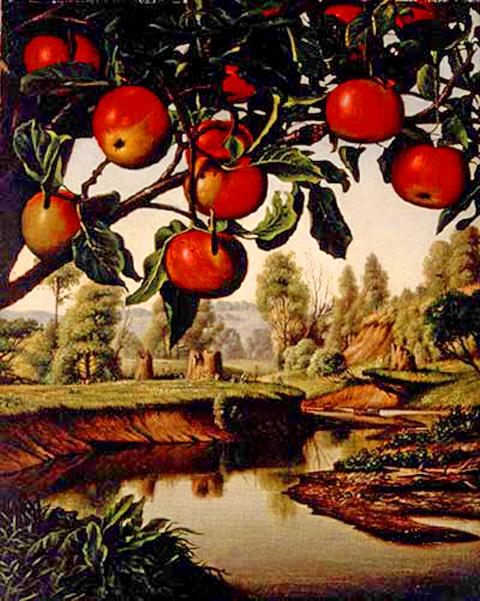Chinese Practice
唾手可得
(tuo4 shou2 ke3 de2)

Photo: Wikimedia Commons
照片:維基共享資源
as easy as spitting into your palm
被後人譽為「宋四大書」其一的《太平御覽》,是古代中國的第一本大部頭「類書」(類似於現代的百科全書),書中引用大約兩千五百七十九份不同類型的書目,其中包括西晉史學家和文學家司馬彪(~西元三○六年)記述東漢歷史的《九州春秋》。雖然《九州春秋》原書早已佚失,不過《太平御覽》在卷三百三十的「兵部六十一」中保存了其中的一段話:「始天下兵起,我謂唾掌而決。至于今日,兵革方始,觀此非我所決,不如休兵力耕,以救凶年。」
根據《太平御覽》所記,《九州春秋》的這段話出自東漢軍閥公孫瓚(?~西元一九九年)之語,他曾與袁紹(西元一五三年~二○二年)交戰數年,爭奪中國北方領土。《後漢書》評其人「恃其才力,不恤百姓,記過忘善,睚?必報,州裡善士名在其右者,必以法害之」,並記錄他為袁紹所敗:「自計必無全,悉縊其姊妹妻子,然後引火自焚。」
儘管爭奪天下霸主之位後來並不如公孫瓚原本所想的那麼簡單,但其人所言「唾掌而決」逐漸演變成為我們今日熟悉的成語「唾手可得」,意指目標輕而易舉就能達成。
在英文中,意義相近的片語是「low hanging fruit」,指的是掛在較低樹枝上的果實,因為處於伸手輕易可及的範圍,毫不費力地就能摘下來。這個片語也就是指容易達成的事物,或是輕易就被說服的人。在企業商務英文中,這個片語經常被拿來形容不用耗費自家公司銷售人員太多力氣,就願意買下產品的客戶,或是毫無困難就能達成的目標,同時卻帶有些微貶抑的意味,暗示其品質並不一定會是最好的。這個片語相近於名詞「easy pickings」(好摘的東西)或是譬喻「like shooting fish in a barrel」──射水桶裡面的魚想必比射大海裡的魚來得容易許多。
(台北時報章厚明譯)
身處網路時代,資訊唾手可得,但多數人還是習慣待在舒適圈,看和自己立場相同的新聞。
(In the Internet age, information is easily available, and yet most people still prefer to stay in their comfort zone and watch or read news that agrees with their own views.)
我們的球隊已有六連勝的戰績,本季冠軍唾手可得。
(Our team has already won six successive games, it’s easily going to win the cup this season.)
英文練習
low hanging fruit; shooting fish in a barrel
The taiping yulan (Imperial Readings of the Taiping Era), considered one of the “Four Great Books of the Song Dynasty,” is the first large encyclopedia of China. It included citations from around 2,579 different kinds of documents. One of these works was the Chronicles of the Nine States, a history of the Eastern Han Dynasty by the Western Jin period historian and literary scholar Sima Biao (d. 306AD). The original Chronicles is now lost, but entry 61 of the section on military affairs of Vol. 330 of the taiping yulan preserves the quote 始天下兵起,我謂唾掌而決。至於今日,兵革方始,觀此非我所決,不如休兵力耕,以救凶年。(When people started amassing armies, I contrived to conquer all, and said it would be over as quickly as spitting into the palms of my hands; as things have transpired, I can see it will not happen like this. I have decided to step back, rest my armies and till the land, until such time as opportunity arises).
According to the taiping yulan, the Chronicles attributed this quote to Gongsun Zan (died 199AD), a warlord who had been fighting Yuan Shao (153-202AD) for control over northern China. A commentary in the hou han shu (Book of the Later Han Dynasty) tells us that Gongsun Zan was arrogant and avaricious, and ruthless in prosecuting any who challenged him. In the end he lost the loyalty of the commoners living on his land and that of his army, and was eventually defeated by Yuan Shao. In the face of defeat, he killed his own family and then committed suicide through self-immolation to avoid the ignominy of being captured.
Even though taking over the world turned out not to be as easy as Gongsun Zan had originally thought, his phrase 唾掌而決 has given us the idiom 唾手可得 — as easy as spitting into the palm of your hand — used when referring to something that is easy to achieve.
In English, the phrase “low hanging fruit” refers to the fruit on the tree hanging from the lower branches, and therefore within easy reach and readily obtained. It is used to mean things that are simple to achieve or people easy to persuade, often used in corporate speak to talk of clients that will buy your company’s product without salespeople having to expend too much effort, or targets that will be no trouble to achieve. It carries with it a slightly pejorative meaning, suggesting that the quality is not necessarily going to be the best. The phrase is similar to “easy pickings” as a noun, or “like shooting fish in a barrel” — presumably much easier to do than shooting them in a vast ocean — as a simile.
(Paul Cooper, Taipei Times)
We don’t have much time to close these deals. Since I have more experience negotiating than you do, I’m going to assign you the low hanging fruit.
(我們並沒有多少時間去談這些生意。我談判的經驗比你多,所以我把比較容易談成的客戶派給你去負責。)
This is so easy I almost feel guilty. It’s like shooting fish in a barrel.
(這真是容易到讓我覺得勝之不武,就好比甕中捉鱉。)

In today’s digital age, every click and swipe generates data, and the need for reliable and efficient data management has become critical. This is where data centers come into play. Data centers include servers, storage drives, networking equipment, and other hardware to manage, process, and store vast amounts of digital information. __1__ For that reason, some companies are pursuing an unusual idea: placing data centers under the surface of the ocean. What makes underwater data centers cheaper than traditional land-based ones? For one thing, the cool temperature of the ocean means that companies can cut down on the high cost of

A: South Korean supergroup BTS member J-Hope, EXO member Xiumin and other various artists are set to tour Taiwan. B: Is J-Hope the first BTS member to visit as a solo singer? A: Yup, he’s going to stage two shows in Taoyuan over the weekend. B: All BTS fans, nicknamed “ARMY,” must be so happy. I wonder when the seven-member group can finally stage a comeback again. A: Well, the good news is the five members currently performing military service will all leave the army next month. So the fans’ long wait is about to end. A: 南韓天團防彈少年團BTS的J-Hope,和EXO的Xiumin等多位熱門歌手最近都要來台開唱。 B:

A: Apart from BTS’ J-Hope and EXO’s Xiumin, Hong Kong singer Eason Chan is holding six concerts in Kaohsiung. B: And versatile British musician Jacob Collier is visiting Taiwan for the first time, performing in New Taipei City tonight. A: US singer Lauv and rock band LANY will also stage individual shows in Kaohsiung next week. B: Plus, Singaporean singer JJ Lin will hold two concerts at the Taipei Dome in early June. A: Which show are you going to? A: 除了BTS的J-Hope和EXO的Xiumin,香港歌王陳奕迅正在高雄熱唱6場。 B: 而多才多藝的英國歌手雅各柯里爾首度訪台,今晚即將在新北開唱! A: 美國歌手洛夫、搖滾樂團藍尼下週也分別在高雄演出。 B: 此外新加坡歌王林俊傑則將於6月初,首次挑戰台北大巨蛋嗨唱兩場。 A: 你想去聽誰的演唱會? (By Eddy Chang, Taipei Times/台北時報張迪)

1. 我不夠快。 ˇ I wasn’t fast enough. χ I wasn’t enough fast. 註:enough用作副詞時,一般放在它修飾的形容詞或其他副詞後面。例如: The tea is hot enough.(茶是夠熱。) He did not work hard enough.(他不夠用功。) 但enough用作形容詞時,前置或後置都可以。例如: There is enough food (/food enough) for us. 2. 今晚七時我們將開董事會。 ˇ We are having a board meeting at seven o’clock this evening. ˇ We are having a board meeting this evening, at seven o’clock. χ We are having a board meeting this evening at seven o’clock. 註:如果有多個時間副詞,一般單位大的放在單位小的後面。例如: I was born in May 1939. The meeting was held at five o’clock yesterday afternoon. 但如果大的單位是說話者強調的重點,則可以放在前面,但後面要有逗號,表示停頓。例如: He arrived yesterday afternoon, at about five o’clock. 3. 我生於麻州波士頓。 ˇ I was born in Boston, Massachusetts. χ I was born in Massachusetts, Boston. 註:一般而言,地點副詞的位置,範圍大的放在範圍小的後面。例如: Before